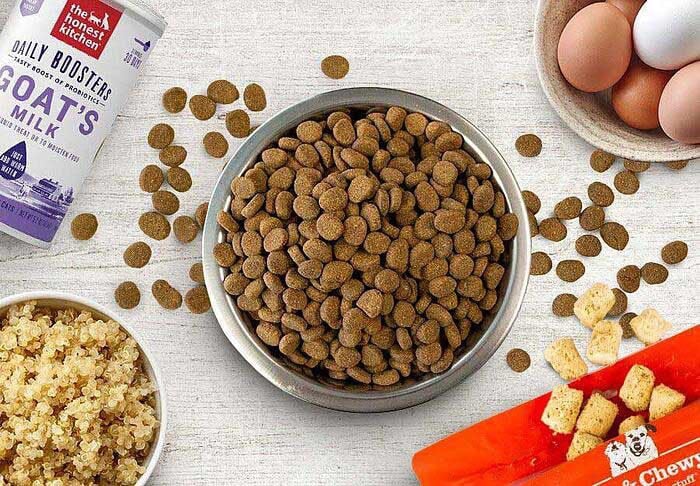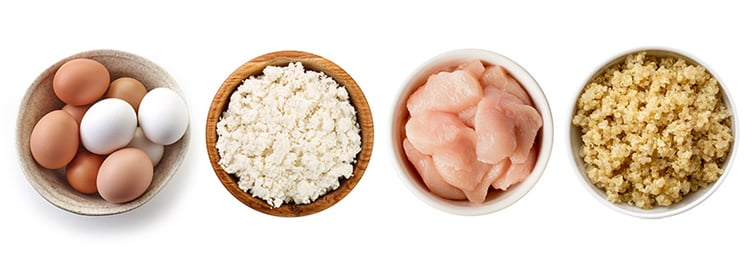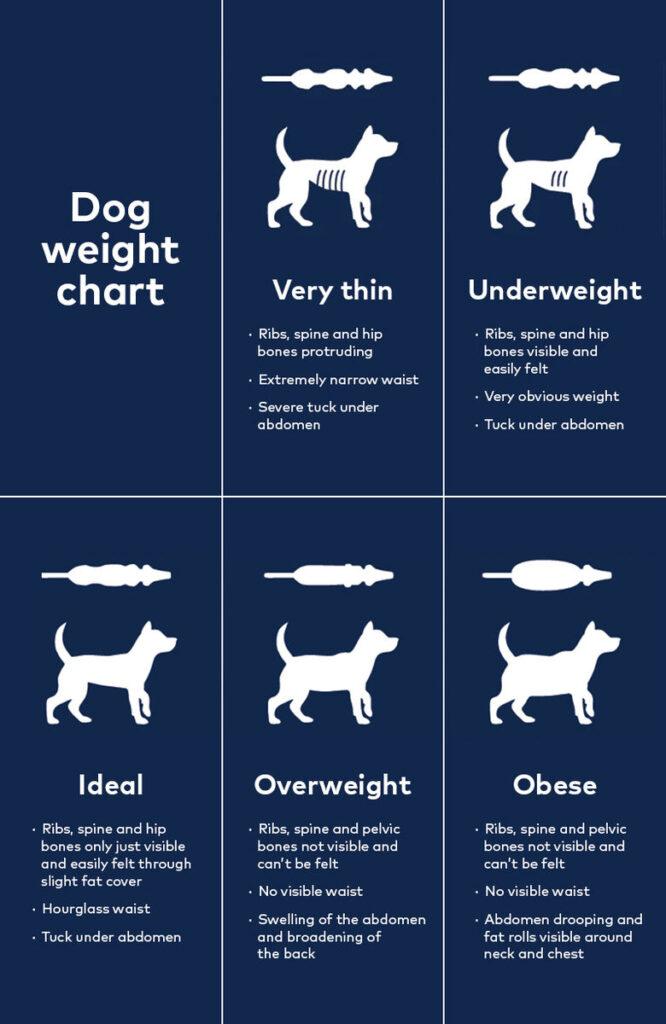Feed your dog high-calorie foods like premium dog food, wet food, or cooked meats. Adding healthy fats such as olive oil or coconut oil can also promote weight gain.
Many pet owners face challenges when their dogs struggle to gain weight. This can occur due to various factors, including illness, high activity levels, or inadequate diet. A balanced approach is essential to help your furry friend reach a healthy weight.
Choosing the right foods can make a significant difference in their overall health and energy levels. Focus on calorie-dense options that provide essential nutrients. Consult your veterinarian to tailor a diet plan that meets your dog's specific needs. With the right strategy, you can help your dog gain weight safely and effectively.

Table of Contents
ToggleIntroduction To Canine Weight Gain
Helping a dog gain weight can be challenging. Many factors affect a dog's weight. Understanding these factors is essential for effective weight management.
Some dogs may be underweight due to health issues. Others might not eat enough due to stress or picky eating habits. Identifying the right diet is crucial for healthy weight gain.
Signs Your Dog May Need To Gain Weight
- Rib visibility: You can see your dog's ribs easily.
- Thin waist: The waist is too pronounced when viewed from above.
- Low energy: Your dog seems lethargic or tired.
- Visible bones: The spine and hip bones are prominent.
- Reduced appetite: Your dog is not interested in food.
Factors Affecting Dog's Weight
| Factor | Description |
|---|---|
| Age | Older dogs may have slower metabolisms. |
| Breed | Some breeds are naturally leaner than others. |
| Activity Level | Active dogs burn more calories and may need more food. |
| Health Issues | Medical conditions can affect weight gain. |
| Diet | Quality and quantity of food play a significant role. |
Assessing Your Dog's Health
Understanding your dog's health is crucial for weight gain. An accurate assessment helps identify the right diet. This section focuses on consulting a veterinarian and knowing your dog's ideal weight.
Consulting A Veterinarian
Visit a veterinarian for a full health check. They can determine if your dog has any health issues. These problems may affect weight gain.
- Discuss your dog’s diet.
- Ask about potential health conditions.
- Get recommendations for weight gain.
Veterinarians can help tailor a plan for your dog. Trust their expertise for the best results.
Understanding Your Dog's Ideal Weight
Every dog has a unique ideal weight. Knowing this helps in setting weight gain goals. Follow these steps to find the right weight:
- Check your dog's breed standards.
- Observe your dog's body condition.
- Use a weight chart for guidance.
Body condition scores can help assess weight. Use the following table for reference:
| Body Condition Score | Description |
|---|---|
| 1 | Underweight, ribs visible, very thin. |
| 3 | Ideal weight, ribs felt, but not visible. |
| 5 | Overweight, ribs not felt, noticeable fat. |
Regular weigh-ins help track progress. Adjust your dog's diet based on these assessments.
High-calorie Foods For Dogs
When your dog needs to gain weight, choosing the right foods is vital. High-calorie foods can help your furry friend pack on some healthy pounds. Here, we explore safe human foods and commercial dog foods that can assist in this goal.
Safe Human Foods
Many human foods are safe for dogs and can boost their calorie intake. Here are some options:
- Peanut Butter: Rich in protein and fat.
- Cooked Eggs: Great source of protein and healthy fats.
- Cooked Chicken: Lean meat that adds calories.
- Sweet Potatoes: Packed with vitamins and calories.
- Plain Yogurt: High in fat and protein.
Make sure to serve these foods in moderation. Too much can upset their stomach. Always remove any harmful ingredients like onions or chocolate.
Commercial Dog Foods For Weight Gain
Many commercial dog foods are designed to help dogs gain weight. These options are formulated to provide extra calories and nutrients. Here are some popular types:
| Brand | Type | Calories per Cup |
|---|---|---|
| Blue Buffalo | High Protein Dry Food | 500 |
| Royal Canin | Veterinary Diet | 400 |
| Hill's Science Diet | Weight Gain Formula | 450 |
Choose a food that suits your dog's needs. Consult your vet for recommendations. Ensure water is always available to keep your dog hydrated.
Nutritional Supplements
Nutritional supplements can boost your dog's weight gain. They provide extra calories and essential nutrients. Always consult your vet before adding supplements.
Omega Fatty Acids
Omega fatty acids are essential for your dog’s health. They promote a shiny coat and healthy skin. These acids also support weight gain by providing extra calories.
- Fish oil is a great source.
- Flaxseed oil can also help.
- Look for supplements with Omega-3 and Omega-6.
Choose high-quality oils. Follow the dosage on the package. Too much can upset your dog's stomach.
Probiotics And Their Benefits
Probiotics help maintain a healthy gut. A healthy gut can improve nutrient absorption. This can lead to better weight gain.
Consider these benefits:
- Improved digestion
- Increased appetite
- Better immune system
Look for probiotic supplements designed for dogs. Choose those with multiple strains for best results.
| Supplement Type | Benefits | Sources |
|---|---|---|
| Omega Fatty Acids | Weight gain, shiny coat | Fish oil, flaxseed oil |
| Probiotics | Better digestion, increased appetite | Probiotic powders, chews |
Feeding Strategies For Weight Gain
Helping your dog gain weight requires careful planning. Focus on the right feeding strategies. These methods ensure your dog receives enough calories and nutrients.
Increasing Meal Frequency
More meals can help your dog consume extra calories. Instead of two meals, consider feeding your dog three to four times a day. Smaller meals are easier to digest and allow for better nutrient absorption.
- Choose high-calorie foods.
- Split daily portions into smaller servings.
- Keep meal times consistent.
These changes can significantly improve your dog’s appetite. Always monitor your dog's response to the new feeding schedule.
Portion Control And Monitoring
Measuring food portions is crucial for weight gain. Use a food scale or measuring cup. This ensures your dog receives the right amount of calories.
| Dog Size | Daily Caloric Needs |
|---|---|
| Small (up to 20 lbs) | 300-600 calories |
| Medium (21-50 lbs) | 600-1,200 calories |
| Large (51+ lbs) | 1,200-2,500 calories |
Monitor weight weekly. Adjust portions as needed. Look for gradual weight gain, not sudden changes. Consult your vet for personalized advice.

Homemade Recipes
Preparing homemade meals for your dog can help him gain weight. These recipes are nutritious and tasty. They allow you to control ingredients. You can ensure your dog gets a balanced diet.
Balanced Diet Homemade Meals
A balanced diet is vital for weight gain. Include proteins, carbohydrates, and healthy fats. Here are some simple recipes:
| Recipe | Ingredients | Instructions |
|---|---|---|
| Chicken and Rice |
| Mix all ingredients. Serve warm. |
| Beef Stew |
| Brown beef. Add vegetables. Cook until tender. |
These meals provide essential nutrients. Adjust portion sizes based on your dog's needs.
Snacks For Extra Calories
Snacks can boost your dog’s calorie intake. Choose high-calorie options. Here are some healthy snack ideas:
- Peanut Butter Balls
- 1 cup oats
- ½ cup peanut butter
- ½ cup honey
- Cheese Treats
- 1 cup shredded cheese
- ½ cup flour
- 1 egg
- Sweet Potato Chews
- 1 sweet potato
These snacks are tasty and rich in calories. They can help your dog gain weight safely.
Exercise For Healthy Weight Gain
Exercise plays a vital role in helping your dog gain weight healthily. It builds muscle and improves appetite. Regular activity can stimulate your dog's metabolism. Choose the right types of exercise for effective results.
Recommended Exercise Routines
Here are some great exercise routines to consider:
- Short Walks: Take your dog on two short walks daily.
- Play Fetch: Use a ball or toy to engage your dog.
- Agility Training: Set up a simple obstacle course at home.
- Swimming: This low-impact exercise is fun and effective.
These activities help build muscle while keeping your dog active. Aim for 30 minutes of exercise each day.
Avoiding Overexertion
While exercise is crucial, avoid pushing your dog too hard. Signs of overexertion include:
- Excessive panting
- Stumbling or difficulty walking
- Refusal to continue
Monitor your dog's energy levels. Always provide water during and after exercise. Rest days are also essential for recovery.
Balance is key. Focus on enjoyable activities. Your dog will gain weight while having fun.
Monitoring Progress And Adjustments
Tracking your dog's weight gain is essential. It helps you make informed decisions. Regular assessments will guide you in adjusting their diet and exercise routine.
Regular Check-ups
Schedule regular vet visits. A vet can monitor your dog's health effectively. They will check:
- Weight
- Body condition score
- Overall health
These check-ups help ensure safe weight gain. Your vet may recommend:
- Frequency of weigh-ins
- Diet adjustments
- Exercise modifications
Keep a record of your dog's weight. This will help track progress over time.
Adjusting Diet And Exercise Based On Results
Monitor your dog's weight regularly. If the weight gain is too slow, consider:
- Increasing food portions
- Switching to higher-calorie foods
- Adding healthy snacks
Adjust exercise as needed. Less exercise may help with weight gain. Consider these options:
| Activity | Adjustment |
|---|---|
| Daily Walks | Reduce duration or frequency |
| Playtime | Shorten intense sessions |
| Training Sessions | Focus on mental rather than physical activities |
Take advice from Pet Expert Dr Marty
ESA Pet is an online service that helps you get a legitimate ESA letter
Pet vitamin supplements and grooming products
Evaluate your dog's progress every few weeks. Adjust diet and exercise based on their needs.

Homemade Dog Food
Frequently Asked Questions About What Should I Feed My Dog to Help Him Gain Weight?
What Is The Best Food To Help Dogs Gain Weight?
High-calorie dog foods are ideal for weight gain. Look for options with protein-rich ingredients, like chicken or lamb. Also, consider adding healthy fats, such as fish oil or flaxseed oil, to their meals. Always consult your vet before making significant dietary changes.
How Can I Increase My Dog's Appetite?
To boost your dog's appetite, try feeding smaller, more frequent meals. Adding tasty toppers, like wet food or broth, can make meals more appealing. Ensure their food is fresh and at room temperature. Regular exercise can also help stimulate their hunger.
Should I Feed My Dog More Often?
Yes, increasing meal frequency can aid weight gain. Instead of two meals a day, consider three to four smaller meals. This approach provides consistent calorie intake and can be easier for your dog to digest. Monitor their weight and adjust as necessary.
Are There Special Treats For Weight Gain?
Absolutely! Look for high-calorie treats specifically designed for weight gain. Options like peanut butter-filled bones or freeze-dried meat can be beneficial. Ensure treats complement their diet without exceeding daily calorie needs. Consult your vet for recommendations tailored to your dog's specific needs.
Conclusion
Feeding your dog to help him gain weight requires careful planning. Focus on high-calorie, nutritious foods that appeal to his taste. Consult your vet for personalized recommendations. Regular feeding schedules and quality ingredients can make a significant difference. With patience and the right approach, your dog can achieve a healthy weight.



















